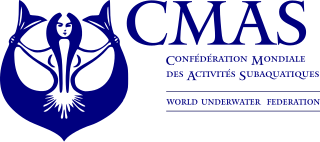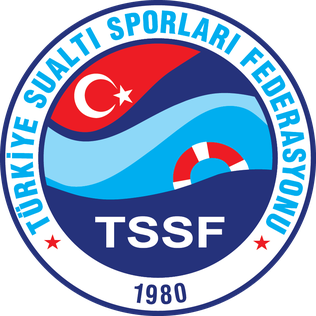
Freediving, free-diving, free diving, breath-hold diving, or skin diving, is a mode of underwater diving that relies on breath-holding until resurfacing rather than the use of breathing apparatus such as scuba gear.

Spearfishing is fishing using handheld elongated, sharp-pointed tools such as a spear, gig, or harpoon, to impaling the fish in the body. It was one of the earliest fishing techniques used by mankind, and has been deployed in artisanal fishing throughout the world for millennia. Early civilizations were familiar with the custom of spearing fish from rivers and streams using sharpened sticks.

Underwater hockey (UWH), is a globally played limited-contact sport in which two teams compete to manoeuvre a puck across the bottom of a swimming pool into the opposing team's goal by propelling it with a hockey stick.

Finswimming is an underwater sport consisting of four techniques involving swimming with the use of fins either on the water's surface using a snorkel with either monofins or bifins or underwater with monofin either by holding one's breath or using open circuit scuba diving equipment. Events exist over distances similar to swimming competitions for both swimming pool and open water venues. Competition at world and continental level is organised by the Confédération Mondiale des Activités Subaquatiques (CMAS). The sport's first world championship was held in 1976. It also has been featured at the World Games as a trend sport since 1981 and was demonstrated at the 2015 European Games in June 2015.
Ron Josiah Taylor, AM was a prominent Australian shark expert, as is his widow, Valerie Taylor. They were credited with being pioneers in several areas, including being the first people to film great white sharks without the protection of a cage. Their expertise has been called upon for films such as Jaws, Orca and Sky Pirates.
Underwater sports is a group of competitive sports using one or a combination of the following underwater diving techniques - breath-hold, snorkelling or scuba, usually including the use of equipment such as diving masks and fins. These sports are conducted in the natural environment at sites such as open water and sheltered or confined water such as lakes and in artificial aquatic environments such as swimming pools. Underwater sports include the following - aquathlon, finswimming, freediving, spearfishing, sport diving, underwater football, underwater hockey, underwater ice hockey, underwater orienteering, underwater photography, underwater rugby, underwater target shooting and underwater video.

Confédération Mondiale des Activités Subaquatiques (CMAS) is an international federation that represents underwater activities in underwater sport and underwater sciences, and oversees an international system of recreational snorkel and scuba diver training and recognition. It is also known by its English name, the World Underwater Federation, and its Spanish name, Confederación Mundial De Actividades Subacuáticas. Its foundation in Monaco during January 1959 makes it one of the world's oldest underwater diving organisations.
The Australian Underwater Federation (AUF) is the governing body for underwater sports in Australia.
The Spanish Federation of Underwater Activities is the governing body in the field of Spanish aquatic sports. As of 2022, the federation has 895 registered clubs and 32,289 federated athlets.
British Underwater Sports Association (BUSA) is the British affiliate of the Sports Committee of Confédération Mondiale des Activités Subaquatiques (CMAS).

The South African Underwater Sports Federation (SAUSF) is the official CMAS (World Underwater Federation) representative in the Republic of South Africa, and is affiliated to the South African Sports Confederation and Olympic Committee (SASCOC).
The Underwater Hockey World Championship is the peak international event for the underwater sport of Underwater Hockey. The event is conducted on behalf of the Confédération Mondiale des Activités Subaquatiques (CMAS) by an affiliated national federation.

Turkish Underwater Sports Federation is the governing body for both underwater sports and lifesaving in Turkey. Founded in 1982 and based in Ankara, the TSSF is a member of both the Confédération Mondiale des Activités Subaquatiques (CMAS) and the International Life Saving Federation (ILS). Its president is Ahmet İnkılap Obruk, who was also elected in 2009 to CMAS' board of directors for a term of four years.

Underwater rugby (UWR) has been played in Australia since 2007 and as of 2016 is played in every State and the Australian Capital Territory.
Finswimming has been conducted in Australia since 1970 and is offered at venues in New South Wales, Tasmania and Victoria. National championships have been held since 1970 and Australia first competed at world championship level in 1990.
The Underwater Society of America (USOA) is the peak body for underwater sport and recreational diving in the United States.

Karri McMahon is an Australian field hockey player for the Hockeyroos who plays as a defender.
Diver organisations are membership based organisations where the membership is wholly, or at least in large part, underwater divers, and the organisation is intended to further a mutual interest related to underwater diving or the aquatic environment as it affects divers or diving activity. Some organisations have more than one focus of interest.
Underwater hockey in Turkey is governed by the Turkish Underwater Sports Federation. The TSSF organizes annual Turkey Cups for masters, under-24, and under-19 men's and women's clubs. National teams of men and women masters, U24 and U19 take part at international competitions.









